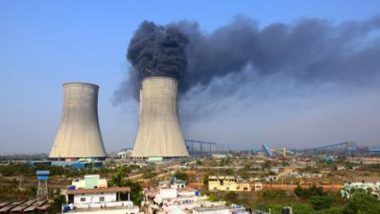Mumbai, Nov 12: As the worlds attention is riveted to the COP27 currently on in Egypt, it emerges that Maharashtra is likely to move from the �Orange Zone to enter the �Red Zone for aerosol pollution in 2023, sparking fresh concerns, researchers said here.
The alarm signal is sounded in a study -- �A deep insight into state-level Aerosol pollution in India', by Kolkata's Bose Institute Associate Prof. Abhijit Chatterjee and his doctoral scholar Monami Dutta, released by ASAR as part of a project under the Simplifying Science Programme. Maharashtra Shocker: 11-Year-Old Boy Dies, One Injured After Compound Wall of Bus Depot Falls on Them in Palghar.
The study said that high aerosol amounts include particulate matter (PM2.5-PM10), comprising sea-salt, dust, sulphate, black and organic carbon.
"If inhaled, the toxic fumes can be harmful to peoples' health, with increased morbidity rate and decreased life expectancy. Aerosol Optical Depth (AOD) is the quantitative estimate of the aerosol present in the atmosphere and can be used as a proxy measurement of PM," said Chatterjee.
"The toxins are spewed into the air by 23 coal-based Thermal Power Plants (TPP) with 72 units, producing 23 GW of power. From these, only 14 units (4.5GW) have either installed pollution control technology, Flue Gas Desulphurisation or claim to be sulphur dioxide limit compliant till August 2022," said an official from the Central Electricity Authority.
A majority of the TPPs in Maharashtra are located in Nagpur, Amravati, Chandrapur, Akola, Jalgaon, Beed and Nashik.
Currently, said Dutta, Maharashtra falls in the �Orange Zone' which is a vulnerable zone with AOD between 0.4-0.5.
"The rising aerosol pollution is likely to push the AOD higher than 0.5 to enter the �most vulnerable' or �Red Zone'," said Dutta. Himachal Pradesh Assembly Elections 2022: Ruling Party Faces Tough Competition With Key Challengers As Old Pension, Inflation Issues Dominate Polls.
Explaining the value of the AOD range from 0 to 1.0, she said 0 indicates a crystal clear sky with maximum visibility and 1 shows a very hazy sky condition.
"AOD value below 0.3 (Green Zone) is safe, 0.3-0.4 (Blue Zone) is less vulnerable, 0.4-0.5 (Orange Zone) is vulnerable, while more than 0.5 (Red Zone) is highly vulnerable," Dutta said.
According to the study by Chatterjee-Dutta, the TPP in Maharashtra has affected air pollution the most in the past, and the TPP capacity is increasing due to the higher demand for electricity.
"If Maharashtra continues to install the TPP capacity as observed in the past, it will enter into the �Red Zone', with a series of health complications for the people of the state. The state can witness an AOD rise of around 7 per cent between 2019-2023," cautioned Chatterjee.
The duo's study identified the main sources of aerosol pollution with solid fuel burning and vehicular emissions besides the coal-based TPPs, in three phases -- 2005-2009, 2010-2014 and 2015, 2019.
The TPP's contribution to the emissions shot up from 31 per cent to 39 per cent in the period 2005-2019, mainly due to increase in capacity and depending on the TPP.
However, the contribution of solid fuel burning to aerosol pollution declined from 24 percent to 18 percent, and vehicular emissions remained constant at 14-15 percent during the same (2005-2019) period.
"Accordingly, Maharashtra needs to reduce its TPP capacity by 41 per cent (10 GW), and not allow any new TPPs to come up to return to the safe �Blue Zone' in public interest," the duo's study has recommended.
The findings of Chatterjee-Dutta were published in August 2022 in the peer-reviewed journal Elsevier, headquartered in Amsterdam, The Netherlands.
(The above story first appeared on LatestLY on Nov 12, 2022 10:39 AM IST. For more news and updates on politics, world, sports, entertainment and lifestyle, log on to our website latestly.com).













 Quickly
Quickly



















